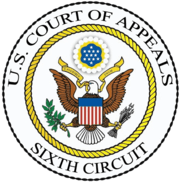Kincaid v. Gibson
Kincaid v. Gibson, 236 F. 3d 342 (6th Cir. 2001) was a United States court case before the United States Court of Appeals for the Sixth Circuit dealing with freedom of expression.
| Kincaid v. Gibson | |
|---|---|
 | |
| Court | United States Court of Appeals for the Sixth Circuit |
| Full case name | Charles Kincaid, et al v. Betty Gibson, et al |
| Argued | May 30, 2000 |
| Decided | January 5, 2001 |
| Citation(s) | 236 F. 3d 342 (6th Cir. 2001) |
| Case history | |
| Prior action(s) | 191 F.3d 719 (1999) Rehearing en banc granted, 197 F.3d 828 (1999) |
| Court membership | |
| Judge(s) sitting | Boyce F. Martin Jr., Gilbert S. Merritt Jr., James L. Ryan, Danny Julian Boggs, Alan Eugene Norris, Richard Fred Suhrheinrich, Eugene Edward Siler Jr., Alice M. Batchelder, Martha Craig Daughtrey, Karen Nelson Moore, R. Guy Cole Jr., Eric L. Clay, Ronald Lee Gilman |
| Case opinions | |
| Majority | Cole, joined by Martin, Merritt, Siler, Daughtrey, Moore, Clay, Gilman |
| Concurrence | Ryan |
| Concur/dissent | Boggs |
| Dissent | Norris, joined by Suhrheinrich, Batchelder |
| Laws applied | |
| First Amendment | |
Charles Kincaid and Carpi Coffer, students at Kentucky State University, filed the suit against Betty Gibson, KSU's Vice President for Student Affairs.
The Kentucky State University reviewed the 1992–1994 edition of The Thoroughbred Yearbook and the administration decided that it was not satisfactory and locked it in a closet. In particular the administration did not feel as though the yearbook should have a section with current events and they did not like the fact that the school colors were not on the yearbook.
Charles Kincaid and Carpi Coffer filed suit on behalf of the students against the university. Initially the lower courts ruled in favor of the school using the Hazelwood v. Kuhlmeier case as an example of how students can be censored by school administrations. Eventually the case made it all the way to the Sixth Court of Appeals. After failing to win a decision the students appealed to have the circuit court rule en banc.
The court heard the case on Jan. 5, 2001 and by a 10–3 decision decided for the students. This is significant because the court made it clear that the Hazelwood case should not be applied to the college media.
In March 2001, the students and KSU settled with money and attorney's fees changing hands to the students. Also the students, seven years later, received their yearbook that they had paid for in 1994.